WordPress Vulnerability Report: July 2021, Part 2
Vulnerable plugins and themes are the #1 reason WordPress websites get hacked. The weekly WordPress Vulnerability Report powered by WPScan covers recent WordPress plugin, theme, and core vulnerabilities, and what to do if you run one of the vulnerable plugins or themes on your website. Each vulnerability will have a severity rating of Low, Medium, High, or Critical.

Vulnerable plugins and themes are the #1 reason WordPress websites get hacked. The weekly WordPress Vulnerability Report powered by WPScan covers recent WordPress plugin, theme, and core vulnerabilities, and what to do if you run one of the vulnerable plugins or themes on your website.
Each vulnerability will have a severity rating of Low, Medium, High, or Critical. Responsible disclosure and reporting of vulnerabilities is an integral part of keeping the WordPress community safe.
As one of the largest WordPress Vulnerability Reports to date, please share this post with your friends to help get the word out and make WordPress safer for everyone.
Get SolidWP tips direct in your inbox
Sign up
Get started with confidence — risk free, guaranteed
WordPress Core Vulnerabilities
WordPress Plugin Vulnerabilities
This section lists recent plugin vulnerabilities. Each plugin in this list includes the plugin name, vulnerability type, patch version info, and a severity rating of the vulnerability.
1. Calendar Event Multi View

Plugin: Calendar Event Multi View
Vulnerability: Unauthenticated Reflected Cross-Site Scripting
Patched in Version: 1.4.01
Severity: Medium
2. Magic Post Thumbnail

Plugin: Magic Post Thumbnail
Vulnerability: Reflected Cross-Site Scripting
Patched in Version: 3.3.7
Severity: High
3. Unlimited Category slider for WooCommerce

Plugin: Unlimited Category slider for WooCommerce
Vulnerability: CSRF Bypass
Patched in Version: 2.1.0
Severity: Medium
4. Speed Booster Pack

Plugin: Speed Booster Pack
Vulnerability: Authenticated RCE
Patched in Version: 4.2.0
Severity: Critical
5. Filter Gallery

Plugin: Filter Gallery
Vulnerability: Unauthorized AJAX Calls
Patched in Version: 0.0.7
Severity: High
6. Popular Brand SVG Icons

Plugin: Popular Brand SVG Icons
Vulnerability: Stored XSS
Patched in Version: 2.7.8
Severity: Medium
7. NMI Gateway For WooCommerce
Plugin: NMI Gateway For WooCommerce
Vulnerability: CSRF Bypass
Patched in Version: No known fix
Severity: Medium
8. WPHEKA Request for Quote
Plugin: WPHEKA Request For Quote
Vulnerability: CSRF Bypass
Patched in Version: No known fix
Severity: Medium
9. WooCommerce Extra Cost
Plugin: WooCommerce Extra Cost
Vulnerability: CSRF Bypass
Patched in Version: No known fix
Severity: Medium
10. Woo MerchantX
Plugin: Woo MerchantX
Vulnerability: CSRF Bypass
Patched in Version: No known fix
Severity: Medium
11. CRM: Contact Management Simplified – UkuuPeople
Plugin: CRM: Contact Management Simplified – UkuuPeople
Vulnerability: Unauthorized Favourite Addition/Deletion
Patched in Version: No known fix
Severity: Medium
12. Travel Light
Plugin: Travel Light
Vulnerability: CSRF Bypass
Patched in Version: No known fix
Severity: Medium
13. Haxcan
Plugin: Haxcan
Vulnerability: Arbitrary File Access
Patched in Version: No known fix
Severity: Medium
14. Slider Hero with Animation, Video Background & Intro Maker

Plugin: Slider Hero with Animation, Video Background & Intro Maker
Vulnerability: CSRF Bypass
Patched in Version: 8.2.1
Severity: Medium
15. Amministrazione Trasparente

Plugin: Amministrazione Trasparente
Vulnerability: CSRF Bypass
Patched in Version: 7.1.1
Severity: Medium
16. Vuukle Comments, Reactions, Share Bar, Revenue

Plugin: Vuukle Comments, Reactions, Share Bar, Revenue
Vulnerability: CSRF Bypass
Patched in Version: 4.0
Severity: Medium
17. WP EasyPay

Plugin: WP EasyPay
Vulnerability: CSRF Bypass
Patched in Version: 3.2.1
Severity: Medium
18. Abandoned Cart Recovery for WooCommerce

Plugin: Abandoned Cart Recovery for WooCommerce
Vulnerability: CSRF Bypass
Patched in Version: 1.0.4.1
Severity: Medium
19. Locations

Plugin: Locations
Vulnerability: CSRF Bypass
Patched in Version: 4.0
Severity: Medium
20. Forms

Plugin: Forms
Vulnerability: Authenticated Stored Cross-Site Scripting
Patched in Version: 1.12.3
Severity: Low
21. WP HTML Mail

Plugin: WP HTML Mail
Vulnerability: CSRF to XSS
Patched in Version: 3.0.8
Severity: Medium
22. WPCS

Plugin: WPCS
Vulnerability: Arbitrary Plugin’s Settings Change via CSRF
Patched in Version: 1.1.7
Severity: Medium
23. Leaflet Map

Plugin: Leaflet Map
Vulnerability: Arbitrary Settings Update via CSRF Leading to Stored XSS
Patched in Version: 3.0.0
Severity: Medium
24. WP Upload Restriction
Plugin: WP Upload Restriction
Vulnerability: CSRF Bypass
Patched in Version: No known fix
Severity: Medium
Plugin: WP Upload Restriction
Vulnerability: Missing Access Control in deleteCustomType
Patched in Version: No known fix
Severity: Medium
Plugin: WP Upload Restriction
Vulnerability: Missing Access Control in getSelectedMimeTypesByRole
Patched in Version: No known fix
Severity: Medium
25. WordPress Meta Data and Taxonomies Filter

Plugin: WordPress Meta Data and Taxonomies Filter Free
Vulnerability: Arbitrary Settings Update via CSRF
Patched in Version: 1.2.8
Severity: Medium
Plugin: WordPress Meta Data and Taxonomies Filter Pro
Vulnerability: Arbitrary Settings Update via CSRF
Patched in Version: 2.2.8
Severity: Medium
26. Astra Pro Addon
Plugin: Astra Pro Addon
Vulnerability: Unauthenticated SQL Injection
Patched in Version: 3.5.2
Severity: High
27. Media File Organizer
Plugin: Media File Organizer
Vulnerability: Directory Traversal
Patched in Version: No known fix
Severity: Medium
28. ProfilePress

Plugin: ProfilePress
Vulnerability: Unauthenticated Cross-Site Scripting
Patched in Version: 3.1.11
Severity: Medium
Plugin: ProfilePress
Vulnerability: Unauthenticated Cross-Site Scripting
Patched in Version: 3.1.11
Severity: Medium
WordPress Theme Vulnerabilities
1. Workreap

Plugin: Workreap
Vulnerability: Missing Authorization Checks in Ajax Actions
Patched in Version: 2.2.2
Severity: High
Plugin: Workreap
Vulnerability: Multiple CSRF + IDOR Vulnerabilities
Patched in Version: 2.2.2
Severity: High
Plugin: Workreap
Vulnerability: Unauthenticated Upload Leading to RCE
Patched in Version: 2.2.2
Severity: High
A Note on Responsible Disclosure
You might be wondering why a vulnerability would be disclosed if it gives hackers an exploit to attack. Well, it is very common for a security researcher to find and privately report the vulnerability to the software developer.
With responsible disclosure, the researcher’s initial report is made privately to the developers of the company that owns the software, but with an agreement that the full details will be published once a patch has been made available. For significant security vulnerabilities, there may be a slight delay in disclosing the vulnerability to give more people time to patch.
The security researcher may provide a deadline for the software developer to respond to the report or to provide a patch. If this deadline is not met, then the researcher may publicly disclose the vulnerability to put pressure on the developer to issue a patch.
Publicly disclosing a vulnerability and seemingly introducing a Zero-Day vulnerability–a type of vulnerability that has no patch and is being exploited in the wild– may seem counterproductive. But, it is the only leverage that a researcher has to pressure the developer to patch the vulnerability.
If a hacker were to discover the vulnerability, they could quietly use the Exploit and cause damage to the end-user(this is you), while the software developer remains content on leaving the vulnerability unpatched. Google’s Project Zero has similar guidelines when it comes to disclosing vulnerabilities. They publish the full details of the vulnerability after 90 days whether or not the vulnerability has been patched.
How to Protect Your WordPress Website From Vulnerable Plugins and Themes
As you can see from this report, lots of new WordPress plugin and theme vulnerabilities are disclosed each week. We know it can be difficult to stay on top of every reported vulnerability disclosure, so the iThemes Security Pro plugin makes it easy to make sure your site isn’t running a theme, plugin or WordPress core version with a known vulnerability.
1. Turn on the iThemes Security Pro Site Scanner
The iThemes Security Pro plugin’s Site Scanner scans for the #1 reason WordPress sites get hacked: outdated plugins and themes with known vulnerabilities. The Site Scanner checks your site for known vulnerabilities and automatically applies a patch if one is available.
To enable the Site Scan on new installs, navigate to the Site Check tab on the Features menu inside the plugin and click the toggle to enable the Site Scan.
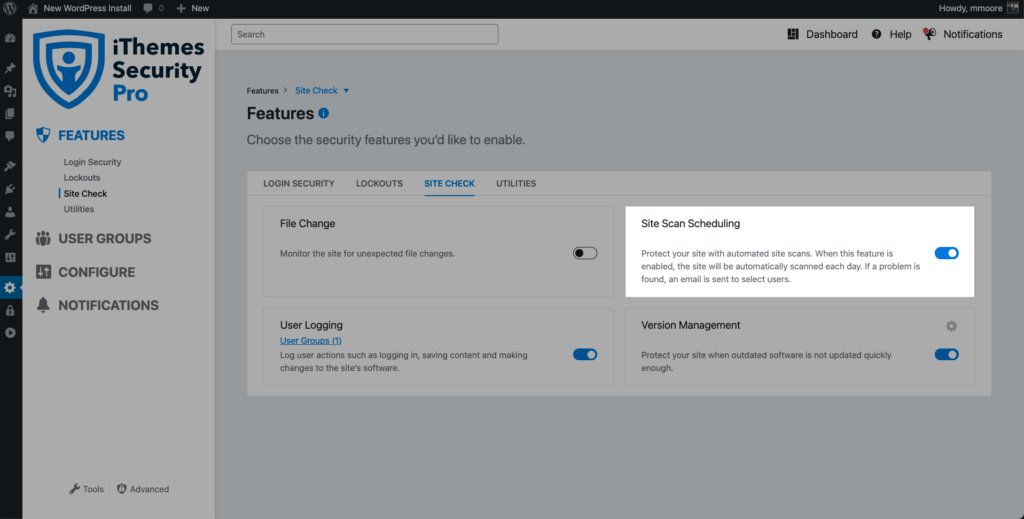
To trigger a manual Site Scan, click the Scan Now button on the Site Scan Security Dashboard card.
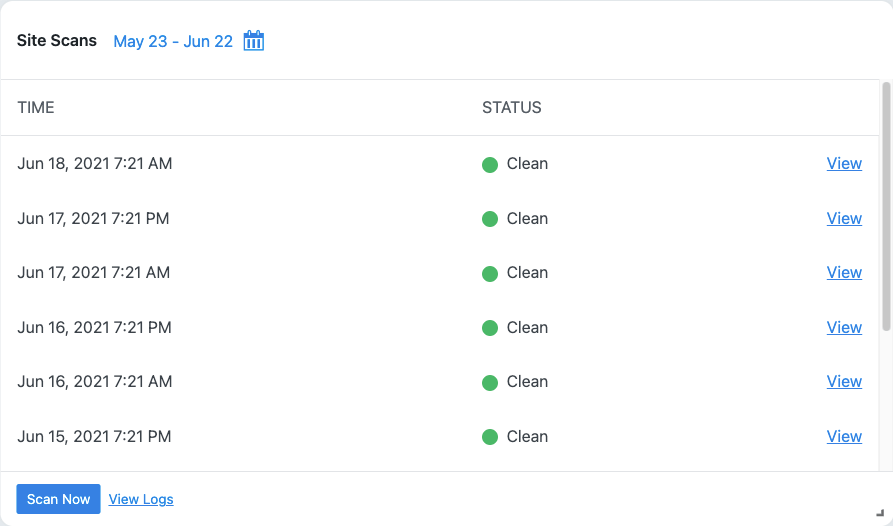
If the Site Scan detects a vulnerability, click the vulnerability link to view the details page.
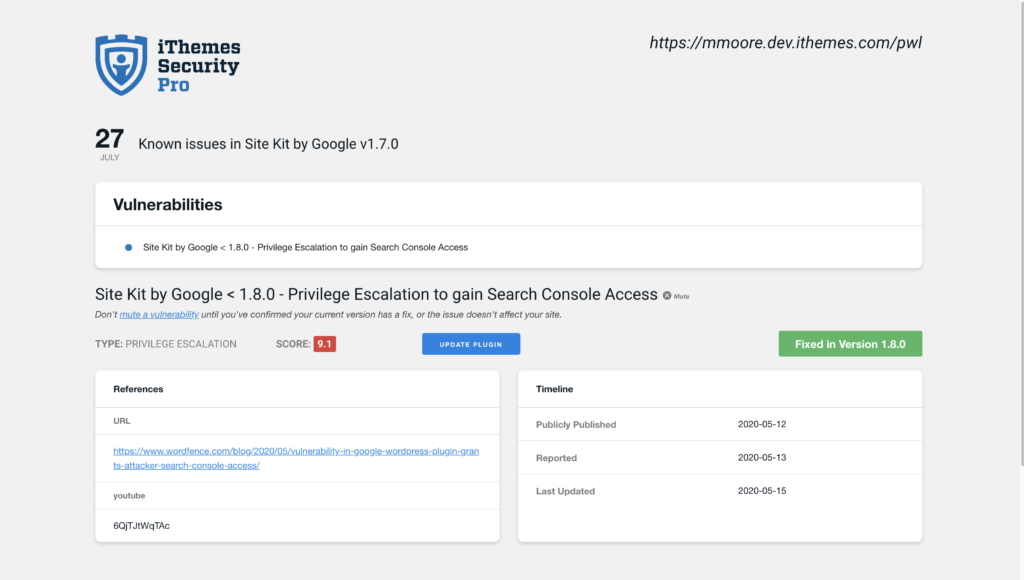
On the Site Scan vulnerability page, you will see if there is a fix available for the vulnerability. If there is a patch available, you can click the Update Plugin button to apply the fix on your website.
2. Turn on Version Management to Auto Update if Fixes Vulnerability
The Version Management feature in iThemes Security Pro integrates with the Site Scan to protect your site when outdated software is not updated quickly enough. Even the strongest security measures will fail if you are running vulnerable software on your website. These settings help protect your site with options to update to new versions automatically if a known vulnerability exists and a patch is available.
From the Settings page in iThemes Security Pro, navigate to the Features screen. Click the Site Check tab. From here, use the toggle to enable Version Management. Using the settings gear, you can configure even more settings, including how you want iThemes Security Pro to handle updates to WordPress, plugins, themes, and additional protection.
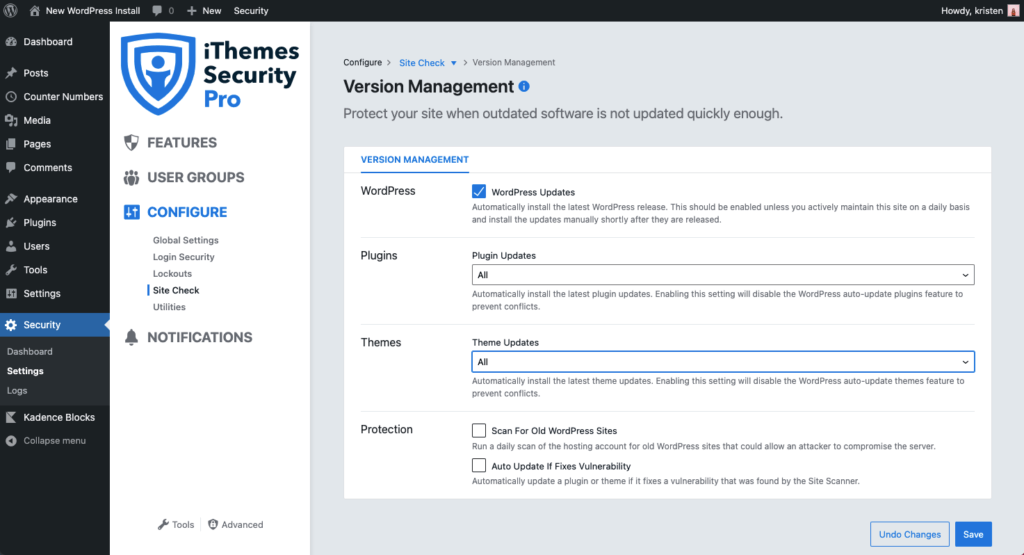
3. Get an Email Alert When iThemes Security Pro Finds a Known Vulnerability On Your Site
Once you’ve enabled Site Scan Scheduling, head to the Notification Center settings of the plugin. On this screen, scroll to the Site Scan Results section.
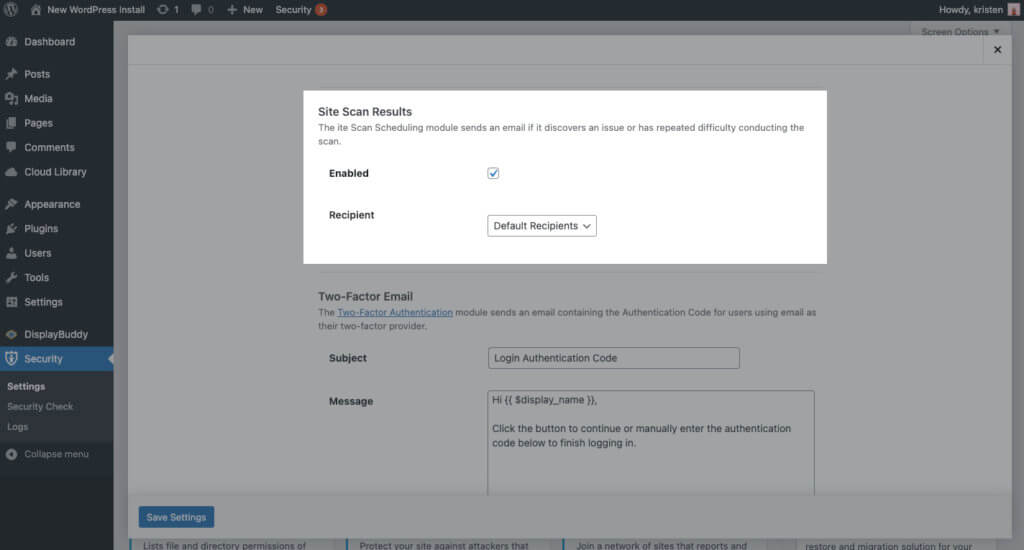
Click the box to enable the notification email and then click the Save Settings button.
Now, during any scheduled site scans, you’ll get an email if iThemes Security Pro discovers any known vulnerabilities. The email will look something like this.
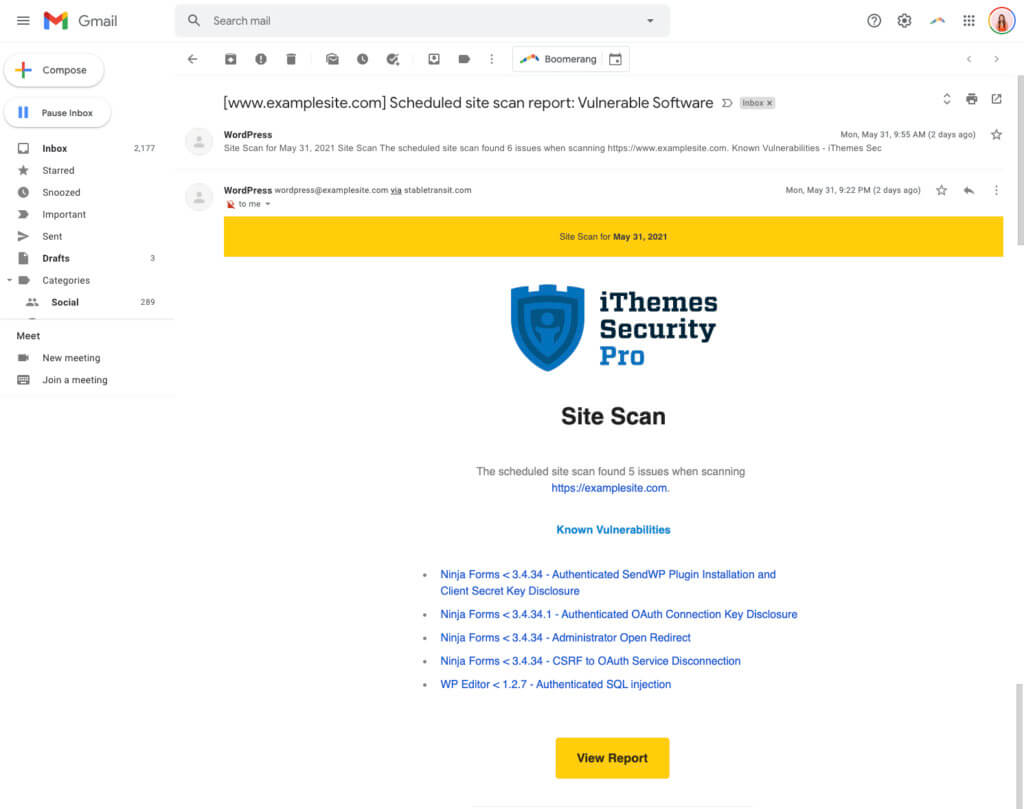
Get iThemes Security Pro and Rest a Little Easier Tonight
iThemes Security Pro, our WordPress security plugin, offers 50+ ways to secure and protect your website from common WordPress security vulnerabilities. With WordPress, two-factor authentication, brute force protection, strong password enforcement, and more, you can add extra layers of security to your website.
Get iThemes Security Pro
Sign up now — Get SolidWP updates and valuable content straight to your inbox
Sign up
Get started with confidence — risk free, guaranteed